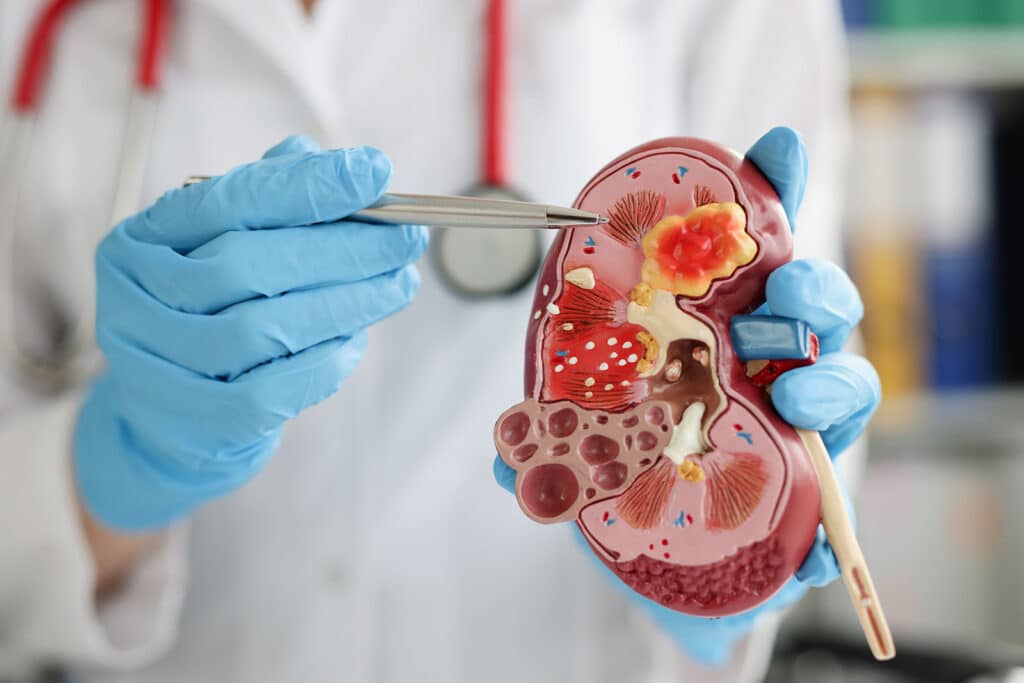TL;DR – Drinking alcohol with one kidney requires caution. Alcohol can strain the kidney, increasing the risk of damage. It’s important to consult a healthcare professional for personalized advice based on individual health status.
Healthy, functioning kidneys are essential for maintaining the health of the human body. Since everyone has two kidneys, people will naturally ask this question at some point: Can you drink alcohol with one kidney?
According to the Centers for Disease Control, or CDC, two-thirds of adults in the United States participate in the consumption of alcohol. Out of these users, many of them will ingest five or more drinks before sleeping. One-fourth of this population sample had indulged in this heavy drinking activity at least one time during the previous year.

This activity is also known as binge drinking, and it can have an accumulated effect on various internal organs over time. The kidneys and liver are both susceptible to damage from binge drinking. In some cases, the damage to the kidneys can be temporary; however, there are also people who have experienced permanent damage to one or both kidneys.
Acute renal failure and related conditions are associated with alcohol use disorder or AUD. It’s important to mention that moderate drinkers rarely experience this level of damage to the kidneys, liver, and other internal organs. Understanding the role of the kidneys and how they are affected by AUD is helpful when attempting to grasp this topic: Can you drink alcohol with one kidney?
Table of Contents
Kidney Function and Alcoholism
The kidneys, essential for filtering toxins from the blood, are profoundly affected by alcohol consumption. This intricate filtration process, crucial for maintaining overall health, involves collaboration between the kidneys and the liver. The National Kidney Foundation emphasizes the importance of understanding how excessive alcohol consumption can jeopardize kidney function and overall well-being.
Kidney function plays a pivotal role in managing bodily toxins. The kidneys’ ability to filter blood via glomerular filtration is vital for removing harmful substances, including those found in alcoholic drinks. However, excessive alcohol consumption places immense strain on these organs, increasing the risk of kidney dysfunction and diseases such as kidney stones.
Individuals with kidney dysfunction face heightened susceptibility to renal issues exacerbated by excessive drinking. The National Institutes of Health underscores that hypertension, often linked to excessive alcohol intake, is a significant risk factor for kidney problems. Moreover, alcohol-induced hypertension can exacerbate heart disease, further compounding health issues.
Maintaining healthy kidneys is paramount, particularly for individuals prone to excessive alcohol consumption. Binge drinking, in particular, poses severe risks to renal function. When both kidneys are healthy, they work synergistically to manage the body’s filtration needs. However, with only one functioning kidney, the burden intensifies, potentially leading to alcohol damage and accelerated kidney deterioration.
The effects of alcohol on mental health are also noteworthy. Excessive drinking can exacerbate mental health issues, compounding the strain on the kidneys. It is crucial to recognize the interplay between mental health and kidney function when addressing alcohol-related concerns.
For individuals grappling with alcohol-related kidney concerns, reducing alcohol consumption is paramount. The National Kidney Foundation stresses the importance of moderation to mitigate the risk of kidney damage. Cutting back on alcoholic drinks can alleviate the excess fluid and workload on the kidneys, promoting renal health.
So, understanding the intricate relationship between alcohol consumption and kidney function is vital for mitigating health risks. By prioritizing moderation and awareness, individuals can safeguard their kidneys and overall well-being against the detrimental effects of excessive alcohol consumption. This information is provided for informational purposes, underscoring the importance of informed decision-making regarding alcohol intake and its impact on kidney health.

Secondary Effects, Drinking with One Kidney
Drinking with one kidney not only poses immediate risks but also introduces secondary effects that can exacerbate long-term health issues, including kidney disease, renal disease, and chronic kidney disease. While the immediate concern may be the potential for long-term renal damage, the secondary effects of excessive alcohol consumption with a single kidney can be equally concerning.
With only one kidney functioning, all normal physiological processes must be managed by a single organ. This includes crucial tasks such as regulating electrolyte levels and maintaining fluid balance in the body. The burden placed on the remaining kidney is significant, especially when compounded by frequent binge drinking.
Over time, the cumulative damage from excessive alcohol consumption can intensify, increasing the risk of kidney disease, kidney failure, and acute kidney injury. The strain on the solitary kidney becomes more pronounced as it bears the full workload of both kidneys. Moreover, the effects of dehydration, a common consequence of heavy drinking, can further disrupt the kidney’s ability to function optimally.
Additionally, alcohol affects hormonal balance and inter-organ communication, further complicating the situation for individuals with only one functioning kidney. This disruption in normal physiological processes can contribute to a cascade of health problems, exacerbating the risk of kidney disease and related complications.
For individuals with a history of heavy drinking and only one kidney, the importance of moderation cannot be overstated. Monitoring the amount of alcohol consumed is crucial to safeguarding the remaining kidney and minimizing the risk of further damage. Moreover, seeking medical advice and support, especially for heavy drinkers, is essential in managing the potential consequences of alcohol consumption on kidney health.
In severe cases where kidney function is significantly compromised and experiencing kidney pain, a kidney transplant may be the only viable option. However, it’s important to recognize that alcohol consumption can also impact the success of a kidney transplant and may necessitate lifestyle changes to ensure optimal outcomes.
To make it simple, the function of the kidneys is intricately linked to overall health, and excessive alcohol consumption can have profound effects on kidney function and long-term well-being. So, by understanding the secondary effects of drinking with one kidney and prioritizing moderation, individuals can take proactive steps to protect their kidney health and mitigate the risk of kidney-related complications.

Alcohol’s Impact on the Kidneys
Binge drinkers who have both kidneys will also experience a decrease in the ability of the kidneys to do their job. The changes in the kidneys are imposed by the presence of large quantities of alcohol in the system. The presence of both kidneys will still work much harder than normal just to deal with the increase in the toxins that accumulate. Toxins in the blood can cause secondary damage over time.
There are other types of damage that also follow this pattern. Dehydration is a concern for binge drinkers, for example. People who wonder can you drink alcohol with one kidney will understand the issue better when visualizing the situation. Every issue that can be objectively observed in binge drinkers with both kidneys is compounded in drinkers with only one functioning kidney.
Alcohol Dehydration, One Kidney
The levels of water in the human body are regulated by the kidneys. Since an alcohol drinker with only one kidney will impose twice the workload onto that organ, this can severely affect the internal regulatory system. The end result is a greater chance of dehydration in drinkers with only one functioning kidney. This will impact the other organs and tissues in the body, and it can even cause secondary damage
Alcohol and the Liver, Blood Pressure
Blood pressure levels can also be affected by heavy drinking. Individuals who have more than two drinks per day risk elevating their blood pressure. This risk increases dramatically if the person drinking only has one kidney. High blood pressure is closely linked to various diseases of the liver and kidneys.
Alcohol use disorder, or AUD, can exacerbate related disorders. Once the liver is damaged, the kidneys must work harder to maintain the ideal rate of blood filtration. People who drink with only one kidney are placing an incredible burden on one organ to filter the blood. This burden will only increase if the liver is also suffering from damage. The actual risks of drinking will, therefore, depend on the rate of alcohol use, frequency, and health of the internal organs. The link between liver disease and kidney disorders is clear; most cases are found in patients with alcohol dependency.

Can You Drink Alcohol With One Kidney?
This question, can you drink alcohol with one kidney, must be understood in the context of the overall health of the alcohol user. This is often a function of age and other medical complications. The longer the alcohol user continues to impose high levels of alcohol on the kidney and liver, the more likely it is that blood pressure levels will rise, cells and other tissues will be damaged, and toxins will accumulate. Drinking with one kidney is not advised, but the occasional drink won’t hurt you. The filtration system of the liver and kidneys must work together in order to keep your body healthy. Alcohol is absorbed right into the bloodstream, and this causes the kidneys to work harder than they must when filtering other substances.
Alcohol use disorder is unlikely to dissuade drinkers from continuing to drink. However, if it’s not presently possible to stop drinking entirely, there are many actions you can take to minimize the damage. This one kidney is now tasked with all of the responsibilities of two kidneys; if the burden is too high for too long a period of time, it could fail. The risks of adrenal failure for a person with one kidney are potentially lethal.
Here are some tips you can take to minimize the damage:
- Regulate your diet and remove any additional toxic substances that you might be ingesting in your food.
- Select an exercise style that is compatible with your current health condition. Regular practice helps the blood to circulate, and this helps the kidneys during the blood filtration process.
- Research other stories about people who live with a single kidney; there’s no need to learn everything the hard way. Tap into the existing body of knowledge that exists.
- Reach your proportional body weight, and stay hydrated.
- Monitor your blood sugar and blood pressure levels, if applicable.
- Get a regular medical exam to detect early problems.
Summary
So, can you drink alcohol with one kidney? While you can still indulge in occasional drinking with one kidney, you should understand that your risks are higher than normal. Take the necessary precautions to protect yourself. Other protective measures also include reducing toxic substances from your diet. You can also avoid certain kinds of medications. If your kidney fails, you might end up requiring dialysis or a transplant procedure.
FAQ
Can you drink alcohol with one kidney?
Citations:
- https://www.healthline.com/health/can-you-live-with-one-kidney
- https://www.kidney.org/news/kidneyCare/winter10/AlcoholAffects
- https://www.kidney.org/atoz/content/alcohol
Published on: 2022-02-26
Updated on: 2024-04-10



